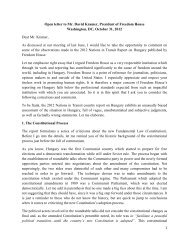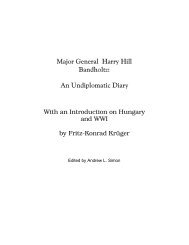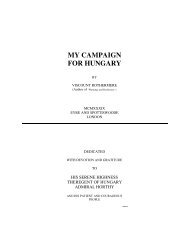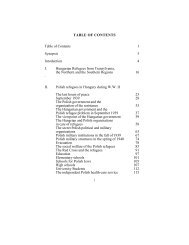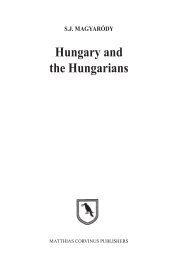The Fate of Western Hungary 1918-1921 - Corvinus Library ...
The Fate of Western Hungary 1918-1921 - Corvinus Library ...
The Fate of Western Hungary 1918-1921 - Corvinus Library ...
You also want an ePaper? Increase the reach of your titles
YUMPU automatically turns print PDFs into web optimized ePapers that Google loves.
etained lawyer József Östör to ask that the memory <strong>of</strong> the greatest Hungarian<br />
not be tarnished by having “the death sentence <strong>of</strong> western <strong>Hungary</strong>” signed in<br />
one <strong>of</strong> his favorite residence. <strong>The</strong> Entente generals relented and the site <strong>of</strong> the<br />
signing was relocated to the military academy’s building on Rákóczi Street. 268<br />
<strong>The</strong> turbulent parliamentary session <strong>of</strong> August 23, which was followed by a<br />
long recess due to the “grave times” – a move objected by many – opened with<br />
one question and three motions regarding the approaching date for the handing<br />
over <strong>of</strong> <strong>Western</strong> <strong>Hungary</strong> before opening the day’s agenda. Among other<br />
things, Count Kunó Klebelsberg 269 said: “I was forced to ask for time before the<br />
agenda, as representative for the free royal city <strong>of</strong> Sopron, to raise my<br />
objections against placing the city under the Austrian yoke. (…) I protest with<br />
my entire being, in front <strong>of</strong> the Entente, Europe and the entire world, because<br />
what is happening in <strong>Western</strong> <strong>Hungary</strong> and the city <strong>of</strong> Sopron is the trampling<br />
underfoot <strong>of</strong> the self-determination <strong>of</strong> people. (…) <strong>Western</strong> <strong>Hungary</strong>, and<br />
especially the city <strong>of</strong> Sopron, has repeatedly expressed its wish, in <strong>of</strong>ficial<br />
events, public assemblies and legal committee decisions, not to be separated<br />
from the country. (…) But we especially protest against Austria because we<br />
deny that Austria has any moral justification to take <strong>Western</strong> <strong>Hungary</strong> from us.<br />
<strong>The</strong> Hungarian nation fully shouldered its share in this world war and ample<br />
Hungarian blood was spilt in the sands <strong>of</strong> Galicia and the limestone rocks <strong>of</strong> the<br />
Karst Mountains 270 for Austria’s territorial integrity. And when Austria and<br />
<strong>Hungary</strong> collapsed after fighting together, the defeated slinks among the victors<br />
and asks for his share <strong>of</strong> the body <strong>of</strong> the Hungarian nation. (Loud noise. Shouts<br />
<strong>of</strong> ‘Shame’ from the right side.) (…) It is my duty, as one who also has Austrian<br />
blood in his veins, to say – and Austria should well note – that there will not be<br />
one man among us who will not look upon it as a sacred duty to nurture in our<br />
souls despair against Austria if it snatches <strong>Western</strong> <strong>Hungary</strong> away from us.<br />
(Vigorous agreement and applause.) As representative <strong>of</strong> the royal free city <strong>of</strong><br />
268 Träger, 1925, op. cit., p. 81.<br />
269 Kunó (Konrad) Klebelsberg (1875-1932). He was Minister <strong>of</strong> State for Education<br />
(January 1914-March 1917) in the second government <strong>of</strong> Count Tisza. With Count<br />
István Bethlen, he was a founder in February <strong>of</strong> 1919 <strong>of</strong> the counter-revolutionary<br />
Right-wing National Unity Party (Nemzeti Egyesülés Párt). During the months <strong>of</strong> the<br />
Hungarian Soviet Republic, he hid in the countryside. He was a parliamentary<br />
representative from 1920 to 1931, and from June <strong>1921</strong> to August 1931, he was minister<br />
responsible for the religious and educational portfolio in the Bethlen government. He<br />
instituted wide-ranging school reforms, building 5,784 modern public educational<br />
schoolrooms, 2,278 teacher accomodations, created 1,555 public and 1,500 school<br />
libraries, and 500 kindergartens. He built the science and technology universities <strong>of</strong><br />
Szeged and Pécs, and completed that <strong>of</strong> Debrecen, suspended due to the outbreak <strong>of</strong><br />
WWI, and laid the foundations for three academies and 21 public health clinics.<br />
270 <strong>The</strong> Karst Mountains lie North <strong>of</strong> Trieste. During WWI, particularly bitter fighting<br />
took place between the forces <strong>of</strong> Italy and the Monarchy along the Isonzo River and on<br />
the Doberdo plateau. Between 1915 and 1917, there were a total <strong>of</strong> 12 battles.<br />
111




